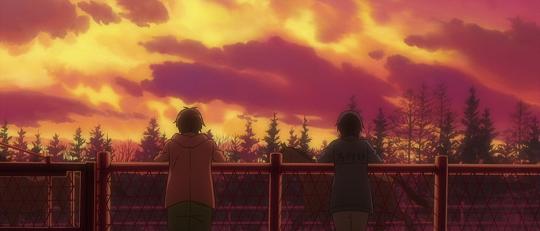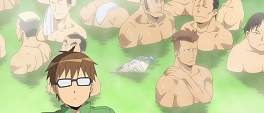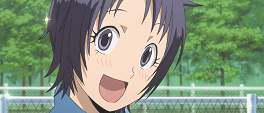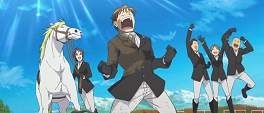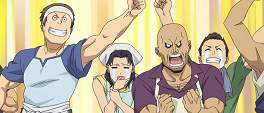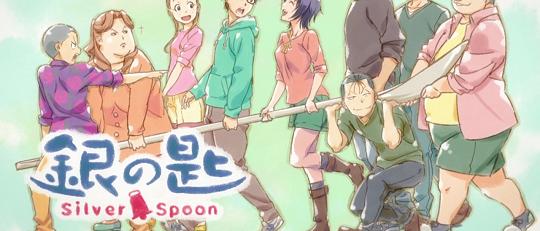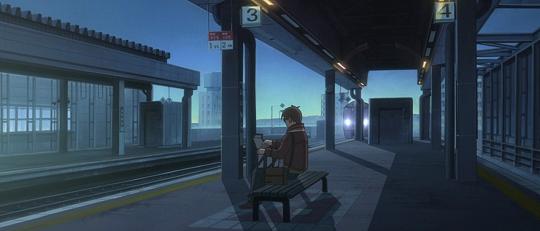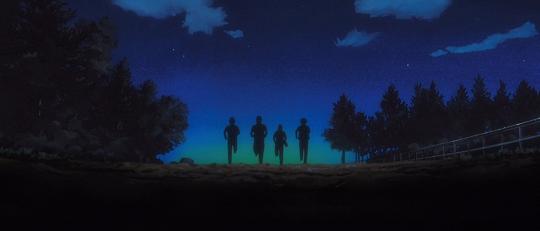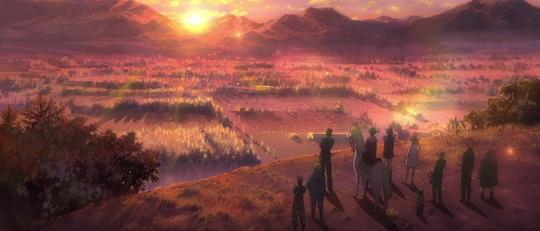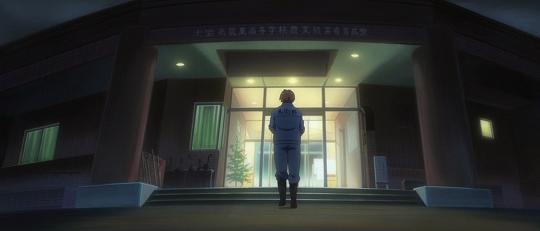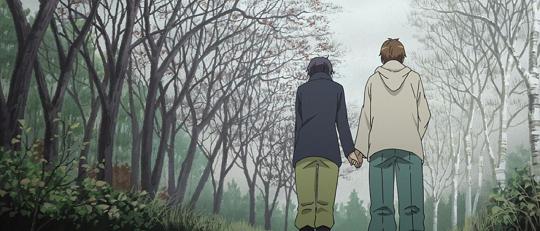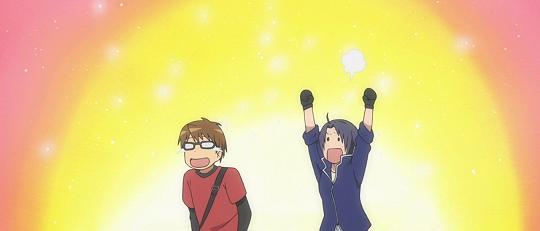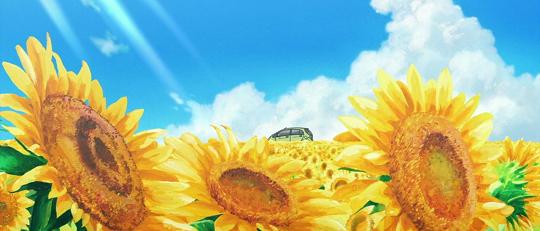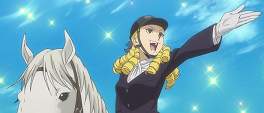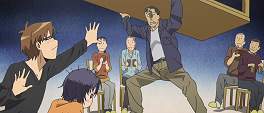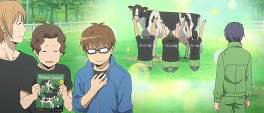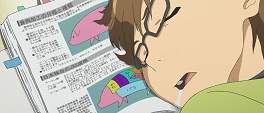For a lot of anime I have a hard time remembering what any of the characters are called once the series has wrapped up; I’m not especially bad with names, most characters just don’t make enough of an impression for me to recall their names. And really, that’s just a polite way of saying that for most characters in anime series, I wouldn’t piss on them if they were on fire. That definitely hasn’t been the case for Silver Spoon (Gin no Saji) because apart from the horse, everyone’s names I find pleasingly easy to recall.
It’s a perfect indication of the gift that Hiromu Arakawa has for crafting characters that, regardless of their circumstances, feel like people more than just archetypes. She may have more experience with farming and agriculture given her being raised on a dairy farm in Hokkaido than alchemists and homunculi but Silver Spoon still has a sparkling sense of personality that renders it such a rare and enjoyable series. Spanning two separate seasons and only twenty two episodes and covering just two terms of Hachiken’s time at an agricultural high school, it’s startling how trepidatious I was when coming to the last episode; not because the series was building towards a climax, but because once I had finished it, the series would no longer be a regular fixture.
I did the same thing with Uchouten Kazoku when it had finished airing, and it’s fair to say even weeks after completing it, I miss Silver Spoon a lot. All the more so because of the lack of a western release of the ongoing manga. It’s not unsurprising though given that it joins Moyashimon in the niche “off-beat but brilliant” category of farming-based series, and that managed only two translated volumes before criminally low sales halted further release. Comparing the two series is fair though because although similar topics and situations, Moyashimon’s university level students and professors had a near fanatical devotion to the heritage of brewing foods and drinks like sake, Silver Spoon’s children and teachers meanwhile have a loving respect for the simple, earthy food that they produce.
It’s difficult not to feel hungry after watching an episode when the care and devotion shown to everything from corn to bacon is as heartwarming as it is stomach rumbling. The processes that create that food - harvesting, churning or slaughtering to name but a few - aren’t ignored either and that forms the thematic backbone of the first eleven episodes for prior city-dweller Yuugo Hachiken. It’s somewhat expected that although Hachiken means well, his introduction to the country life would be harsh and the obvious culture shock he would feel would be the overriding hook of the series. In reality that’s all wrapped up within the first episode and the true theme of both seasons reveals itself to be Hachiken fighting the borderline fatalism of his peers, all of whom have grown up on farms and in agricultural communities.
That emotion behind the phrase “Shikata ga nai” / “It can’t be helped” is prevalent throughout, yet Hachiken uses his different upbringing to (politely) challenge the blind acceptance of many practices by his schoolmates. Be that the slaughtering of pigs or a farm closure due to lack of money, Hachiken questions the status quo with a reverence and respect for the situation and crucially the people involved. So while the first season is about Hachiken coming to terms with the reality of the agricultural world, the second sees him meeting a harsh reality and learning when to fight and when to “let go of the reins”.
It sounds like a lot to lay at the feet of just one character in a group of so many memorable ones, yet it’s handled with stunning care and attention. It’s through juxtaposition with Hachiken that we become acquainted with all the other characters, whether that’s Aikawa’s slightly squirmish dream to become a vet, Komaba’s myopic focus on baseball glory or Mikage’s fervent desire to work with horses. Hachiken could quite easily have come off as a wishy-washy everyman who, like the protagonist of a magical girl series, tumbles through life on earnestness and good-intentions. Instead you get an empathetic character who is prepared to roll up his sleeves and muck in, all the while learning in very real terms that even though you may try hard and have the best of intentions you may not succeed, that being a jack of all trades isn’t always desirable and though you may try, you can’t do everything all the time.
It’s fitting that the second season’s opening by Fuji Fabric is called LIFE when it often feels like that’s what the series as a whole is about. From birthing to pooping to death and love and all points in between. Weirdly then the first season’s opening by miwa is called Kiss you when it’s the second that sees Hachiken and Mikage’s relationship develop into something more than just friends. The potential was of course there from their first meeting, however the way in which it progresses is charmingly natural with a mutual respect and reliance developing between the two that feels reciprocal and genuine. It doesn’t go much further than furtive hand holding by the end of the twenty second episode and though mildly disappointing not to have some kind of a resolution to it, it’s hard to fault the steady, determined evolution of it.
Evolving despite the parental pressures that are applied throughout. Most keenly felt in the square-jawed overbearing stare of Hachiken’s father but similarly so in the ever present expectation that children born of farm owners will eventually take over. All aspects of this are explored with some accepting it as a given, some revelling in the new opportunities and some fighting against it, if only a little. It would be easy to demonise someone like Hachiken’s father who appears like a storm and leaves just as much devastation in his wake but never is he played as evil or cruel, just a harsh personality from another time who has managed to raise two children and is guilty on of still believing he knows what is best for them. Though protagonist Yuugo isn’t outwardly rebelling against his father, his brother Shingo turned away from a prestigious Tokyo University position to become a glorified vagrant more or less to spite his father and much to the chagrin of Yuugo.
Hachiken’s fractious interactions with his family shows a different side to his personality than the normally upbeat and eager-to-please demeanour he shows to all of his classmates and teachers, a fact not missed by his junior school classmates who previously, had only been shown in sombre black and white. It’s a change that only family, only blood, can enact but demonstrates just how likeable Hachiken and everyone else is. From the principal to the Buddha-like equestrian club teacher to Beppu to Yoshino, everyone is the type of person you would want to meet and get to know and have on your team; though the series as a whole deals with some serious and life-changing incidents, the geniality and friendliness of the people, not least of which Hachiken at the forefront, makes the whole something truly special.
It’s not often that you can compare something with the powerhouse of storytelling that is Mushishi, but like it, Silver Spoon manages is a story of people and naturalism while still having a keen sense of place and time. The ongoing tribulations of Hachiken may seem pedestrian when described but the series as a whole can surprise you over and over again, whether that’s by its restraint in not being too Saturday-morning Disney saccharine or by it dipping into the often brutal life of modern farming. Taken as two separate series there are plenty of opportunities for juxtaposition: whether that’s Hachiken eating at Mikage’s boisterous family table versus his own, or going from halcyon school days to job-hunting and money woes. There is an awful lot to love with the series and it rockets straight in to being not only a gateway anime for new and potential fans but an absolutely sterling story through and through. Long may Hiromu Arakawa produce stories and characters like this because although it shares nothing in the way of subject matter, like Fullmetal Alchemist before it, rare and precious are series as brilliant as this.
